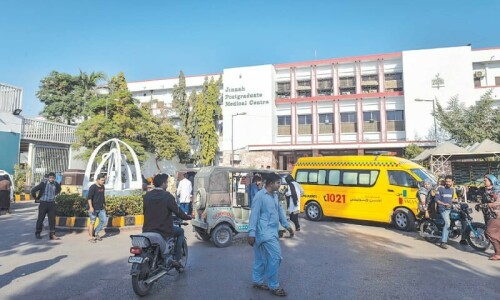KARACHI: Automated mobile phone health messages delivered through an interactive voice response system led to a 26 per cent increase in vaccine coverage under a randomised controlled trial spanned over 3,300 households in rural and urban areas in Sindh, shows a study.
The increase in vaccine coverage was found to be substantially higher than three other interventions and a control group which did not show a statistically significant increase in immunisation uptake.
The study titled Paigham-i-Sehat (A message of health) was conducted by the Aga Khan University (AKU) and the University of British Columbia in collaboration with digital health and telecommunications specialists to develop a variety of mobile campaigns containing targeted messages on immunisation.
Experts have hoped that the study findings would help overcome vaccination challenges in Sindh. The province has one of the lowest rates of routine immunisation in Pakistan with seven out of 10 children at risk of contracting preventable, and often fatal, diseases such as diphtheria, pertussis and hepatitis B.
According to these experts, text and voice messages represent an accessible and low-cost means to promote access to lifesaving vaccines in line with targets under Goal 3 of the sustainable development goals given the fact that 97 per cent of the province’s population owns mobile phones.
“Our study has generated novel insights on the value of voice messages which is an innovative medium for health awareness. The study’s findings are particularly useful in contexts where literacy is a challenge, where a variety of local languages and dialects are present or where users face trouble using SMS,” said Dr Momin Kazi, an assistant professor in paediatrics at child health at the AKU.
Local insights were incorporated in the study’s design through the help of focus groups. The focus groups showed that Sindhi was the language of choice for citizens in the interior parts of Sindh while text messages in Roman Urdu (Urdu written in English) would be more effective for those living in Karachi.
Health messages also reflected local views on the most effective content for the audience. These ranged from information on the health benefits of vaccines, religious
considerations (vaccinations are compulsory for those undertaking Haj and Umrah) to warnings on the adverse effects of avoiding immunisation.
These messages were then delivered through four different mediums to generate evidence on the most effective means to boost demand for routine immunisation.
Experts at the Aga Khan Development Network’s Digital Health Resource Centre developed an online application ‘Paigham-e-Sehat portal’ which enabled the research team to track the response to each intervention.
Field workers also verified if infants had been immunised at the 14-week stage through follow-up calls and a visit at 20 weeks of age.
Researchers noted that the SMS interventions faced a variety of challenges from users complaining they never received messages to the issue of the SMS ‘getting lost’ in a long series of texts from friends and commercial entities.
Another challenge noted in rural areas was that a single phone is shared by many family members and community members. This meant that even if the SMS was read, the message was often not passed on to the child’s caregiver.
Overall, voice messages proved more appealing with one of the participants from the Karachi site saying: “Automated calls are better than SMS, people are busy at work and do not read SMS. Calls are better.”
This study was funded by a Rising Star grant from Grand Challenges Canada and a training grant from the US National Institute of Health’s Fogarty International Centre.
Published in Dawn, September 9th, 2019












































Dear visitor, the comments section is undergoing an overhaul and will return soon.